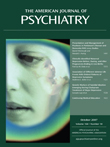The Cognitive and Negative Symptoms in Schizophrenia Trial (CONSIST): The Efficacy of Glutamatergic Agents for Negative Symptoms and Cognitive Impairments
Abstract
Objective: Patients with schizophrenia frequently present with negative symptoms and cognitive impairments for which no effective treatments are known. Agents that act at the glycine site of the N -methyl- d -aspartic acid (NMDA) glutamatergic receptor have been suggested as promising treatments for moderate to severe negative symptoms and cognitive impairments. Method: The Cognitive and Negative Symptoms in Schizophrenia Trial (CONSIST) was a 16-week double-blind, double-dummy, parallel group, randomized clinical trial of adjunctive glycine, d -cycloserine, or placebo conducted at four sites in the United States and one site in Israel. The participants were 157 inpatients and outpatients who met DSM-IV criteria for schizophrenia or schizoaffective disorder and retrospective and prospective criteria for moderate to severe negative symptoms without marked positive, depressive, or extrapyramidal symptoms. The primary outcome measures were the average “rate of change” of Scale for the Assessment of Negative Symptoms (SANS) total scores and change in the average cognitive domain z scores. Results: There were no significant differences in change in the SANS total score between glycine and placebo subjects or d -cycloserine and placebo subjects. A prespecified test for the site-by-treatment-by-time interaction was significant in post hoc tests. One site had greater reduction in the SANS total score for patients receiving d -cycloserine relative to patients receiving placebo. A second site had greater reduction in the SANS total score for placebo patients compared with glycine patients. There were no significant differences between glycine and placebo or d -cycloserine and placebo subjects on the average cognition z score. Conclusions: The study results suggest that neither glycine nor d -cycloserine is a generally effective therapeutic option for treating negative symptoms or cognitive impairments.



